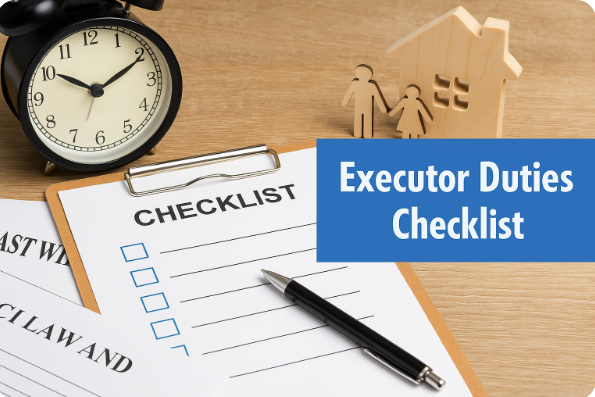Introduction: The Role No One Prepares You For
Losing a loved one is hard enough. But when you’re named executor of their estate, you suddenly find yourself juggling grief with legal paperwork, creditors, and family expectations. Most people never plan for this role—until it’s handed to them.
This checklist is designed to help you navigate your executor duties with clarity. We’ll cover what to do in the first days, weeks, and months after someone passes, with examples from Florida, California, and New York.
Step 1: Secure the Death Certificate
The first document you’ll need is the death certificate. Most banks, insurance companies, and government offices require a certified copy.
- Action: Order 10–15 copies from the funeral home or local vital records office.
- Pro tip: Some institutions won’t accept photocopies—request extras up front.
Step 2: Locate the Will (and Trust Documents)
If there’s a will, you must file it with the probate court in the county where the deceased lived.
- Florida: Executors (called “personal representatives”) must file the will within 10 days of death.
- California: Executors must file the will with the local court and notify heirs within 30 days.
- New York: Executors submit the will to the Surrogate’s Court in the county of residence.
If there’s a trust, much of the estate may bypass probate—but you’ll still need to notify beneficiaries and manage assets.
Step 3: Secure Property and Assets
Your next responsibility is to safeguard what the deceased owned:
- Lock the home, forward the mail, and maintain insurance.
- Make an inventory of assets—real estate, bank accounts, vehicles, personal valuables.
- Freeze or monitor financial accounts to prevent unauthorized access.
Step 4: Begin the Probate Process
Probate is where you, as executor, get the legal authority to act on behalf of the estate.
- File a petition with the probate court.
- Receive “letters testamentary” (or “letters of administration” if no will).
- Open an estate bank account to handle income, expenses, and distributions.
State timelines:
- Florida: Small estates (under $75,000) may qualify for “summary administration” to shorten probate.
- California: Probate is required if the estate exceeds $166,250 in value (excluding certain assets).
- New York: The Surrogate’s Court process depends on whether it’s a small estate (under $50,000) or full probate.
Step 5: Notify Creditors and Government Agencies
Executors must ensure debts and taxes are paid before heirs inherit.
- Creditors: Publish a notice in a local paper (required in many states). Creditors typically have 3–7 months to file claims.
- Social Security: Notify the Social Security Administration to stop payments.
- Medicare/Medicaid: Report the death to prevent overpayments.
- Utilities & subscriptions: Cancel or transfer services.
Step 6: Pay Debts, Taxes, and Expenses
Before distributing assets, you must settle what the estate owes.
- Funeral expenses, court fees, and administrative costs.
- Credit card balances, mortgages, or loans.
- Federal and state income taxes (final return for the deceased).
- Estate taxes (rare but apply to larger estates).
State note:
- Florida and California follow a priority order—funeral expenses and administration costs are paid first, then creditors.
- New York requires executors to carefully document creditor payments in court filings.
Step 7: Distribute Assets to Beneficiaries
Once debts and taxes are cleared, you can distribute what’s left according to the will or state intestacy law.
- Transfer titles (real estate, vehicles).
- Close the estate bank account once distributions are made.
- Provide an accounting to the court and beneficiaries (required in many states).
Step 8: Close the Estate
When all debts are paid and assets distributed, file a “petition for discharge” (or similar closing paperwork) with the probate court. This formally ends your duties as executor.
The Bottom Line
Serving as an executor is an honor—but also a serious legal responsibility. The role comes with deadlines, paperwork, and fiduciary duties. By following this checklist, and seeking legal guidance when needed, you can protect your loved one’s legacy while keeping your own peace of mind intact.
What Happens to Credit Card Debt When Someone Dies
Estate Planning Basics: Protecting Your Family From Debt and Delays
Probate Explained: What Families Need to Know

Pingback: Estate Planning Basics: Wills, Trusts & Family Protection